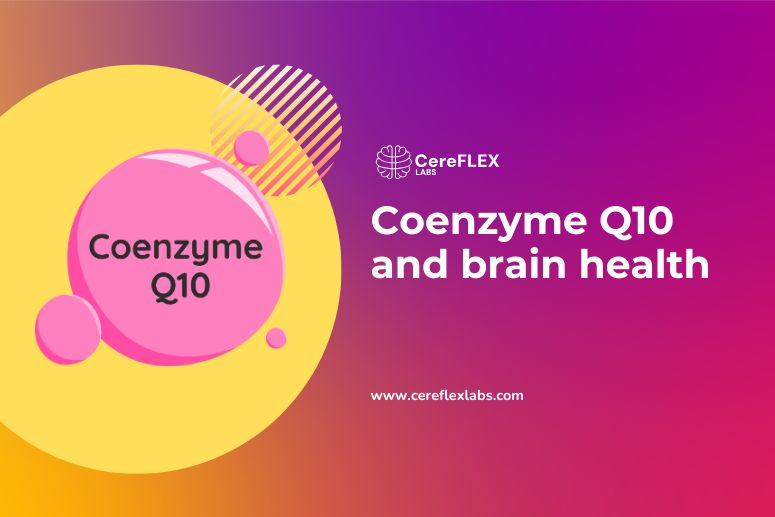Your brain demands energy around the clock—even at rest. Coenzyme Q10 (CoQ10) helps keep that system running by fueling cells and protecting them from stress. As levels decline with age or illness, memory and focus can suffer. This guide explains how CoQ10 supports cognitive health—and when supplements might help.

What is Coenzyme Q10 (CoQ10)?
Coenzyme Q10 (CoQ10) is a nutrient that exists in every cell of the body, especially in organs with high energy demands like the heart, liver, and brain. It plays two essential roles: helping to generate energy and acting as an antioxidant that protects cells from damage.
Inside the mitochondria, your cells’ energy centres, CoQ10 supports the production of ATP (Adenosine Triphosphate—the molecule that powers nearly all biological activity, from muscle movement to memory formation. This energy support is vital for brain function, which consumes around 20% of the body's energy even at rest.
CoQ10 exists in two forms:
- Ubiquinone (oxidized): The form found in most supplements. Your body must convert it into its active state.
-
Ubiquinol (reduced): The active antioxidant form circulating in the blood, more readily used by cells.
Your body naturally switches between these forms depending on need. Ubiquinol helps neutralize free radicals—unstable molecules that can harm cells and DNA, contributing to inflammation, aging, and chronic diseases.
Although your body produces CoQ10 on its own, levels tend to decline with age, illness, and the use of medications like statins. That’s why CoQ10 is often included in targeted nutritional supplements to help support energy and cognitive resilience as we age.

How CoQ10 Supports Brain Function
The brain depends on a constant supply of cellular energy and robust defences against oxidative damage. Coenzyme Q10 plays a vital role in both, making it a key nutrient for maintaining cognitive performance—especially as we age.
Mitochondrial Support in Neurons
Neurons require high amounts of ATP to communicate, release neurotransmitters, and form memories. CoQ10 helps fuel this process by supporting ATP production inside the mitochondria.
When CoQ10 levels are adequate, neurons can function efficiently. But when levels drop—due to age, stress, or certain medications—energy production declines, which may lead to fatigue, slower thinking, or mood changes.
Supporting Research
In an animal study, researchers supplemented aging rats and ALS-prone mice with CoQ10. They observed increased levels of CoQ10 in the cerebral cortex and mitochondria, enhanced mitochondrial activity, reduced brain lesions, and an extended lifespan in the ALS mice. These results point to CoQ10’s potential to support mitochondrial health and protect against neurodegeneration.1
Reducing Oxidative Stress
The brain is especially sensitive to oxidative stress. It uses more oxygen than most organs, contains a high concentration of fat (which oxidizes easily), and has limited native [antioxidants]. This imbalance can accelerate brain aging and contribute to cognitive decline.
CoQ10, particularly in its reduced form (ubiquinol), helps:
- Neutralize free radicals
- Regenerate vitamin E and other antioxidants
- Protect mitochondrial membranes from lipid peroxidation
Supporting Research
Cell and animal studies have shown that CoQ10 can reduce oxidative markers in the brain and improve neuronal resilience. In models of early-stage neurodegeneration, CoQ10 supplementation protected brain cells from damage caused by reactive oxygen species, helping preserve cognitive performance.2
Scientific Evidence and Studies Supporting Brain Health Benefits of Coenzyme Q10
Interest in CoQ10 as a brain health supplement has led to an expanding body of research—especially on its potential to slow age-related cognitive decline and protect against neurodegenerative diseases.
While most studies have been conducted on animals, the findings are consistent in showing improvements in mitochondrial activity, reductions in oxidative damage, and preservation of memory-related functions. Here are three notable examples:

CoQ10 and Age-Related Cognitive Decline
In one study, researchers tested CoQ10 in 24-month-old male Wistar rats. After 14 days of supplementation with varying doses (100, 200, or 300 mg/kg), only the highest dose significantly improved memory performance in object recognition tests.
CoQ10 also partially restored ATP levels in the hippocampus and reduced markers of oxidative damage. It even helped normalize proteins involved in mitophagy—cellular processes that maintain mitochondrial quality.3
CoQ10 and Cognitive Function
In a study using Tg19959 mice—a model for age-related cognitive decline—CoQ10 supplementation improved learning and memory. Researchers found a significant drop in brain protein carbonyls (markers of oxidative damage) and fewer Aβ42 plaques. The mice also showed better performance in spatial memory tasks like the Morris water maze. These results suggest CoQ10 may support cognitive performance by protecting neuronal health.4

CoQ10 and Alzheimer’s Disease
Separate research looked at how CoQ10 could counter damage related to Alzheimer’s disease. In rats injected with β-amyloid peptides, which impair synaptic activity, CoQ10 supplementation helped preserve synaptic strength and learning capacity.
The rats retained long-term potentiation (LTP)—a mechanism vital for memory—and showed reduced oxidative markers in brain tissue. This suggests CoQ10 may help buffer against Alzheimer’s-related cognitive decline.5
CoQ10 and Parkinson’s Disease
Another animal study focused on brain changes related to Parkinson’s disease. Rats treated with CoQ10 showed improved motor function and a decrease in enzymes that promote inflammation and cell death. The supplement also boosted markers linked to dopamine production, which is crucial for movement and coordination.6
CoQ10 Supplementation: What You Need to Know
As we age, the body’s ability to produce CoQ10 naturally declines. For those looking to support memory, focus, or resilience against cognitive aging, supplementation may offer an effective way to restore those levels.
How much CoQ10 should you take?
There’s no one-size-fits-all dose for CoQ10. Clinical studies have used a wide range—from as low as 50 mg per day to as high as 1,200 mg. For brain health, typical daily doses range between 100 to 500 mg, often split across two doses.7
Always follow product instructions or consult a healthcare professional, especially if you take medications or have chronic health conditions. Absorption can vary depending on the form and your individual metabolic health.
Are there any side effects?
CoQ10 is widely considered safe and well-tolerated. Mild side effects may include:
- Nausea or stomach discomfort
- Headache
- Diarrhea
- Allergic skin reactions (rare)
These usually occur at higher doses and can often be reduced by splitting the daily amount into two or more servings.
However, individuals taking medications for blood pressure, blood thinning, or blood sugar regulation should speak to a healthcare provider before starting CoQ10.
CoQ10 Interactions with Medications
Certain drugs may interact with CoQ10, particularly due to its effects on oxidation and clotting. These include:
- Cancer therapies (e.g., cisplatin, cyclophosphamide): CoQ10's antioxidant effects could potentially counteract the intended oxidative mechanisms of some chemotherapy drugs.
- Warfarin (Coumadin): CoQ10 may decrease warfarin’s blood-thinning action, raising clotting risk. Monitoring INR levels is essential.
-
Antihypertensives: CoQ10 can lower blood pressure, so combining it with medications like losartan or amlodipine may cause hypotension. Adjustments may be needed.
Always check with your doctor before starting CoQ10 if you're on prescribed medications.

Can you get enough CoQ10 from food?
CoQ10 is naturally found in a variety of foods, particularly those rich in fats and proteins. While a balanced diet can help maintain general CoQ10 levels, it’s unlikely to provide enough for therapeutic effects—especially for brain-related benefits.
Top Food Sources of CoQ10
Animal-based foods tend to contain higher concentrations due to their mitochondrial density. Some of the richest dietary sources include:
- Organ meats like liver, heart, and kidney (especially from beef or pork)
- Fatty fish such as mackerel, sardines, salmon, and tuna
- Muscle meats including beef, pork, and chicken
- Whole grains like wheat germ and oats
- Vegetables such as spinach, broccoli, and cauliflower (in smaller amounts)
- Legumes and nuts, including peanuts, soybeans, and pistachios
- Oils like soybean and canola
Why Food Intake May Fall Short
Even a diet rich in CoQ10-containing foods may not supply enough for people with specific needs, such as:
- Adults over 40
- Individuals with chronic stress or inflammation
- People taking statins, which suppress CoQ10 production
- Those with digestive or metabolic absorption issues
In these cases, supplementation is often recommended to reach levels shown to be beneficial in research.

CoQ10 in the Context of Brain Health Products
Because of its role in energy metabolism and cellular protection, CoQ10 is a common ingredient in brain health supplements—especially those designed for long-term cognitive support.
It’s often combined with nutrients like magnesium, B vitamins, and herbal compounds to promote mental clarity, memory, and resilience against oxidative damage.
Cereflex Labs AM/PM Protocol: A Targeted Example
One notable example of an integrated, CoQ10-powered cognitive support system is the Cereflex Labs AM/PM Protocol, a two-part supplement designed to align with the brain’s natural rhythms:
AM – Brain Morning Formula:
- Promotes daytime focus and mental energy
- Includes CoQ10 to support mitochondrial function and antioxidant defence
- Delivers essential vitamins and minerals for sustained cognition
PM – Cognitive Support Evening Formula:
- Aids cellular recovery while you sleep
- Supports circulation, important for oxygen delivery to brain tissue
- Includes antioxidants to help neutralize overnight oxidative stress
Together, the AM/PM system offers comprehensive support for cognitive longevity—providing CoQ10 in the context of a broader formulation that complements its strengths.
Conclusion
Coenzyme Q10 plays a foundational role in maintaining brain health. It fuels cellular energy production, helps neutralize oxidative damage, and supports key processes involved in memory, focus, and long-term cognitive resilience.
As levels decline with age or chronic stress, supplementing with CoQ10—especially in its ubiquinol form—can be a practical way to support mental clarity and neurological well-being.
While dietary sources can help maintain baseline levels, they typically fall short of the amounts studied for cognitive benefits. For those looking to maintain brain performance over time, targeted supplements that include CoQ10—like CereFLEX Labs’ AM/PM Protocol—can provide structured, science-informed support throughout the day and night.






